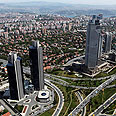
Islamic banks flourish in secular Turkey
Turkish government issues banking licenses to two new financial institutions which use Sharia-compliant methods, like not charging interest
Last month, the Turkish government – controlled by the conservative Islamic-rooted Justice and Development Party (AKP) – issued banking licenses to two new Islamic banks.
The licensing is a move to expand so-called "participation banks" that use Sharia-compliant financial methods, like not charging interest. Islamic banks also avoid investments in products that are not halal (permissible according to Sharia law), or involve alcohol or gambling.
The new banks will join four Islamic banks that comprised more than 5% of the Turkish banking sector. That is leaps and bounds from where the Islamic banks' piece of the Turkish banking sector was when it emerged in the 1980s, struggling for attention. "It always had a small share," Atilla Yesilada, an Istanbul-based consultant with Global Source Partners, an economic and political consultancy firm, said.
The original creation of the Islamic banks in the 1980s was part of an effort to liberalize the country's economy. Turkish clients initially viewed the banks with skepticism as being linked to the Arab world. The government was also far from supportive of the banks, according to Yesilada.
Changes in Turkey's economy and politics since 2002 when AKP took power, however, have helped the sector to grow.
After the 2001 Turkish economic crisis, sweeping banking reforms were passed to give the state more control of the private banking sector. The resulting regulations helped open access and credit to Islamic banks, Yesilada said. They offered an alternative to conventional banks. Certain investments in participation banks also became insurable under Turkish law.
Economic analysts viewed the changes as a defining moment for Islamic banks.
Following the reforms and economic collapse of 2001, Islamic banks' assets in Turkey increased five times over, Deputy Prime Minister Ali Babacan said in a speech last September at a financial conference in Malaysia. The growth in market shares follows a 2005 law that helped open the doors to the expansion of participation banks.
Regardless, Yesilada sees the role of the new banks as purely financial. "This is not an ideology matter, this is a business matter," he said. "As long as money comes in, no one questions if there are any political motivations."
'Ethical ways of conducting businesses'
Indeed, deposits and investments in the Islamic banking institutions continue, so much so that Islamic banks are expected to nearly double their share of the sector in Turkey by 2018, according to a May 2013 report from Kuwait-based Islamic investment research firm KHF Research.
The banks have also become popular with those uncomfortable with traditional ones.
"For the Muslims, it is a system in line with their faith, so they feel comfortable engaging in business transactions that do not include speculation and other types of services that the Koran…and Sunnah which includes the sayings and practices of the prophet Muhammad, have clearly prohibited," Muhammad Jameel Yusha'u, from the Saudi Arabia-based Islamic Development Bank of which Turkey is a member, told The Media Line.
The banks may also prove attractive to others as well. "For non-Muslims who partake in Islamic banking it fits in with ethical ways of conducting business, let alone those who fear running out of business or at worst losing their business and remain indebted by having to still pay the interest incurred," Yusha'u said.
The worldwide economic meltdown in 2008, which led to significant international banking and economic reform worldwide, also brought more depositors to the perceived security and integrity of Islamic banks, according to Yusha'u.
In one 18-month period ending in March 2012 Islamic banks in the Gulf region of the Middle East grew at double the rate of conventional banks, according to a report by The Financial Times.
Meanwhile, Turkish regulatory and economic officials have begun to steer state investments away from the West.
The European Union remains Turkey's largest trading partner, but government officials have grown increasingly interested in diversifying to emerging markets throughout the Middle East and Africa. That is in line with the lure of Islamic banks as Turkey looks to the East, Yesilada said.
That means that what initially put off Turks when Islamic banks emerged in Turkey – interest in the Arab world - may be what is now boosting their popularity.
Article written by Steve Dorsey
Reprinted with permission from The Media Line










